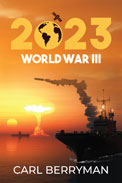
 |
In this thought-provoking novel, Mexican mercenaries, supplied by an Asian contact, raid and rape across the southern United States border. Masses of Chinese soldiers attempt to take back former territory in Southeast Asia. Someone with a plan, political backing, and the money to make it happen gives the orders. Other nations must learn that costly and early preparations are required to retaliate and end the conflict. They must also accept that modern war technology is highly varied, ranging from pistols to computers to submarines to biological weapons.
Society takes for granted satellite communication which allows people to see what is happening around the world. The author's tale pulls away that safety blinder with a blast as satellites are disabled in areas where the Chinese are positioning and moving troops. Masters of subterfuge, their captains are ordered to incite hatred of neighboring groups then pillage for food supplies with a scorch-and-burn policy after killing men and raping women. Who can predict what their ultimate goal is? Where will opposition lines be drawn before World War III goes all-out nuclear?
Obviously geared toward a mature audience due to its graphic details, this book offers an in-depth look at what a global war could look like in the near future. The author repeatedly proves a statement made in the first chapter of this book by a leading military character: politics and military affairs are inseparable. Because the narrative is so broad and sweeping, a helpful list of characters fills five pages at the front of the book. Berryman has carefully studied the theories and commentary of military strategists across the centuries. This book reiterates many recorded facts to illustrate what happens when the living forget what the deceased learned at great cost. Readers fascinated by combat and warfare history will likely gain much from Berryman's two-pronged teaching method.
RECOMMENDED by the US Review